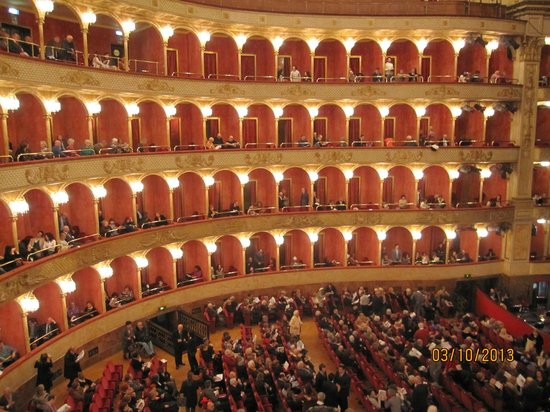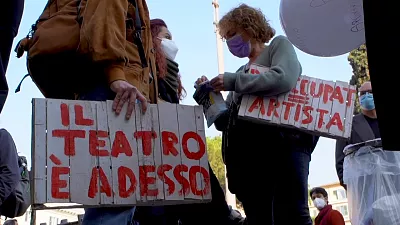The Theatre of Rome
There’s no place like Rome. Since time immemorial, the “Eternal City” has been theatre of scandals, conspiracies, back-stabbings, secret meetings and power-sharing agreements. When we picture this in our heads, everyone is wearing a Roman toga but the reality of it, is much more cashmere-y. What’s been happening with the National Theatre of Rome proves that old habits die hard and, if clothes evolve, the predisposition of the Romans to plot and scheme does not.
On January 20th, the board of directors of the National Theatre of Rome was set to pick a new Director General from a list of 42 candidates. Of the three finalists – all men in their 60s – there wasn’t one the President and the representatives of Region, Government and Council could agree on, so Region and Government – the right-wing majority – went on to elect Luca De Fusco, former artistic director of Stabile di Napoli, without the presence or the approval of the other board members (one of which, the Council, supplies two thirds of the ToR’s financing budget). This episode – part of a wider plan that sees the Right taking office in the main cultural institutions – opened a Pandora’s box and sparked outrage both between the public and many leading figures of the Roman Culture.

The following day, assembled outside Teatro Argentina – the centrepiece of the Theatre of Rome – the President and the Council delegation spoke in front of a crowd of art workers, activists and onlookers, loudly condemning this attempted take-over at the hands of the Right and promising open communication and support to all of those who are involved in the activities of the ToR.
Shortly after, the same board members who had proclaimed their indignation outside Teatro Argentina, endorsed the worst deal possible. A deal that smells of centrist moderation and incompetence, of seats’ partition, and of those closed-doors meetings where the Roman consuls would shake hands at the expenses of others. In this case, the others – the injured party – are the art workers and the theatre’s aficionados. With this deal, the Centre-left secured a place in the ToR’s management team (an administrative figure to flank Luca De Fusco, who will act as Artistic Director) but irredeemably lost the trust of the art’s community. The frustration of which, built up during years – not days – of bad governance, injustices, and precariousness, gave life to the Constituent Assembly of the Art Workers.
They gathered once again outside Teatro Argentina, asking that the board of directors let them have the assembly inside and, on the 30thJanuary, were met by an alignment of police in anti-riot gear. The following day, the Constituent Assembly was denied access to another venue of the ToR and the police started identifying those handing out flyers. When, in a public assembly held at Campidoglio, the Major of Rome and the Council’s delegate were confronted on this shameful episode, they denied responsibility and kept an overall evasive attitude.
When we think that the Theatre of Rome is a public asset and that the citizens have a constitutional right to participate and being involved in its management, this incomprehensible display of law enforcement appears even more surreal and uncalled for. The consequences are a permanent fracture between the art workers and those who were meant to safeguard them and a reinforcement of the narrative in which Rome is a city where people make art not thanks to, but in spite of the institutions.
De Fusco as Artistic Director is a choice that speaks of a dying world that refuses to die – a world where a small clique of white, over-65 men cling to power – migrating from seat to seat – even when it means going against the cultural growth of the country. To put things into prospective, while De Fusco was Artistic Director of Stabile di Napoli, out of all the productions, less than 10% were directed by women, there was little to no support for new writing and the productions signed by director over 75 were more than double the ones signed by directors under 40.
Once again, tradition, convention and marketability triumph in a context where innovation should be key.

In an insightful interview, Alessandro Toppi said that, between other things, the job of the ToR is to listen to the county and to the city and to tune in with their different social, political and artistic realities, creating a space where their voices can be heard, nurtured and amplified. With these premises, the questions we should ask to the board of directors are: does the Artistic Director Luca de Fusco understand the theatrical needs of the country and of the city of Rome? Is he in touch with the artistic realities that enliven the cultural landscape and with the themes of the new generations? Can he guarantee an innovative, pluralistic, and diversified programme, with a multidisciplinary and international character?
The lack of vision, initiative, and the deep-rooted clientelism displayed by those at the top of the pyramid, have created a context of utter precariousness for everyone who works in the performing arts and have produced a climate of scarcity, where Culture is treated like a non-renewable resource. 40% of all the employees of the Theatre of Rome are precarious, the industry’s wages are dramatically below the European average and there are no steady steams of income for the artists. It goes without saying that, in these financial and contractual landscape, refusing work – even under the most demeaning conditions – becomes very hard, paving the way for mobbing, sexism, intimidations and blackmailing in the workplace (as evidences by a recent investigation by Fanpage.it).
Faced with this sad reality, the artists and art workers have developed a knack for self-organisation and have sought new spaces in which to express themselves. This happens despite the institutions’ constant attempt to erase and suppress the independent realties that animate Rome and the systematic closure of spaces for creativity, rehearsals and production. In this “empty boxes’ policy” – as theatre critic Graziano Graziani calls it – Teatro Valle, which for three years (2011-2014) was occupied and kept alive by a large group of art workers, has been closed for ten years. Teatro Eliseo, put up for sale in 2022 at the exorbitant amount of 24 million euros, is closed even after having received conspicuous public fundings. The programme of artistic residencies and education in place at the Pelanda/Mattatoio was recently discontinued after an initial success and many alternative circuits – like Spin Time Labs, occupied building home to 150 families from different nationalities and countless artistic realities – are under eviction.
In Rome, the words unofficial, informal, independent, occupied have become synonymous with creative freedom, participation and experimentation for the art’s community. Gathered at Spin Time Labs, the Constituent Assembly of the Art Workers has declared the “state of cultural disaster” and decided to use the events of the last few weeks as an impetus to get out of a cultural crisis that has been going on for way too long. The Assembly embodies the art worker’s desire for “something else entirely”, from which the slogan #vogliamotuttaltro; #wewantsomethingelse. This collective action, which is self-convened, self-determined and intersects a pluralism of artistic configurations and experiences, is testament to a renewed social, political and cultural responsibility and it’s given itself the task to imagine a new artistic landscape in Rome.

More generally, the present right-wing Italian government is aiming to take long-term control of the institutions which represent the state. As an example, President Mattarella has recently questioned the excessive use of force by the police against students in Pisa and Florence protesting about Gaza (https://www.ansa.it/english/news/2024/02/25/salvini-ducks-question-on-mattarella-on-policing_99effdbb-c135-4497-a621-44ab07147313.html ). This is being seized on by the right to undermine the President – the right wants the powers of the President to be curtailed, so that they have more freedom.
This “short march through the institutions” may be one of the most dangerous elements of the current Italian situation. The Italian constitution is generally regarded as being pretty robust, but if someone wants to move the goalposts (aka Overton window), it may be possible over time. Most things look much the same, but they are at risk.
Surely, control of state institutions (the parliament, the presidency, the judiciary) is the defining characteristic of any government. I’d be much more concerned with the state extending its control over civic institutions like the ToR. IN a liberal democracy, these should remain independent of the state.